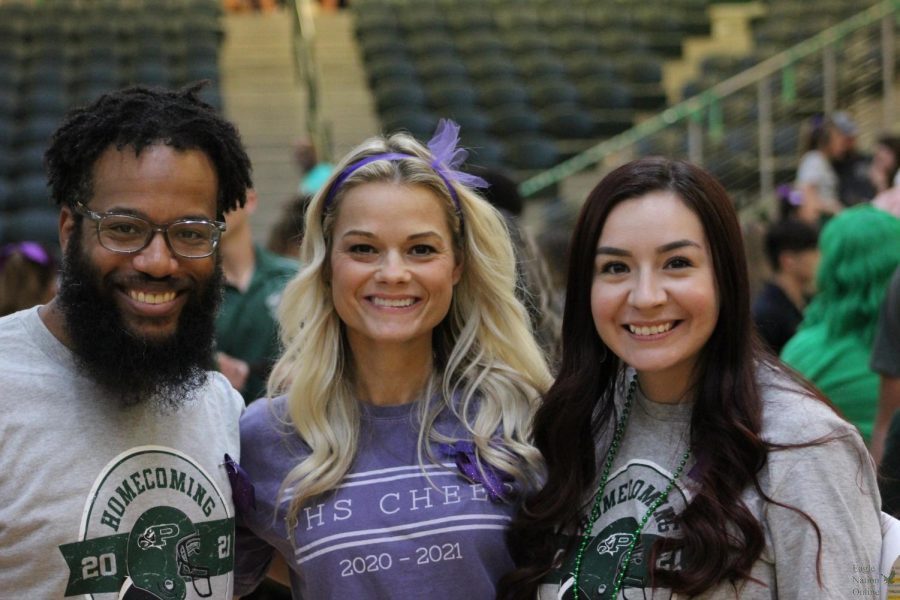Freshman cheerleading coach faces new role, challenges
Following the Friday, Sept. 24, pep rally, cheer coaches Cameron Jones, Emily Allen and Mariessa Mesa gather for a photo. Jones coaches the varsity team, Allen focuses on the JV team and this is Mesa’s first year coaching freshman cheer. “She lets people feel like they’re involved,” Freshman cheerleader Kamie Kline said. “She never lets anyone feel like they don’t have a special role on the team. She makes sure everyone feels important and they have a spot on the team and feel like they made the team for a reason.”
Mariessa Mesa focuses in on team building between athletes
The roar of the crowd and the sound of the buzzer spark adrenaline in Mariessa Mesa and the team she leads as they get ready to fulfill their role.
Mesa, the freshman cheerleading coach, started coaching high school cheer for the first time this year. Last year, Mesa, who also helped sponsor student council, experienced her first year teaching in Prosper as she taught English 1. Previously, Mesa taught at a private school in Michigan.
“So, this is actually my first year coaching,” Mesa said. “I mean, I did little league, but that’s different. A cheer coach position became available at the end of the school year last year, and Dr. Roan asked if I wanted to interview for it, and I was like, ‘Heck yeah I do,’ so, here I am.”
Mesa started cheering in kindergarten and continued until third grade. After taking a break, she cheered from seventh to 12th grade.
“She lets people feel like they’re involved,” freshman cheerleader Kamie Kline said. “She never lets anyone feel like they don’t have a special role on the team. She makes sure everyone feels important, and feel like they made the team for a reason.”
Mesa said she hopes to do more team-building activities outside of school to help her athletes feel connected.
“You have those moments when sometimes girls do feel left out, or they make mistakes outside of school that affect what they can and can’t do in cheer,” Mesa said. “It is a dangerous sport, and I think that’s what a lot of people don’t realize. I think that’s always what’s scary for me, is when the girls get injured.”
Mesa said that injuries is one of the “biggest adversities” she faces as a cheer coach.
“We always try to support one another and make sure that we’re all on the same page, and if somebody makes a decision that maybe administrators don’t like or whatever, we, all three of us, own it,” Mesa said. “I think not only does that go for the girls but for us as coaches, as well. Because if we can model that for them, then they will have a better grasp on what their team unit should look like. I think you always try to present that united front – whether it’s teaching or coaching – because if the students see that you’re divided, or if your athletes see that you’re divided, then the whole thing falls apart.”
Mesa said that teaching and coaching carry similarities, not including the fact that the coaches see each other often, which allows for a “strong bond.”
“We, as coaches, try to stress that if you hear somebody bad-mouthing your teammate outside of cheer, you stand up for them,” Mesa said. “You defend the program. You represent the school in a positive light. I would say that building that family – that bond – that kind of transcends just what happens in the arena, that it goes outside, and that you’re always making sure that you have each other’s backs. No matter what.”




